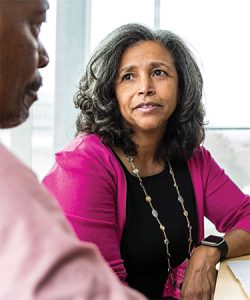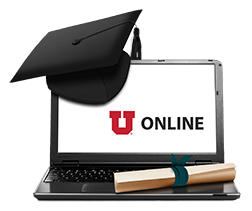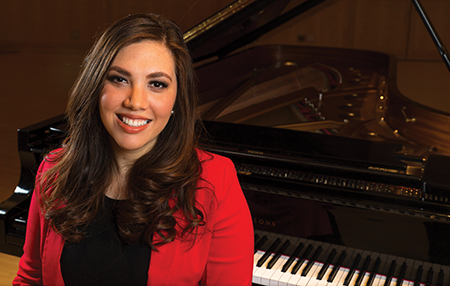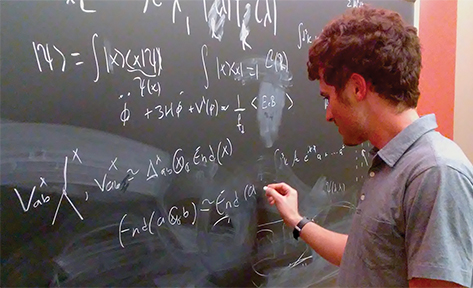U to Begin Search for New University President and Head of Health Sciences
On May 1, President David W. Pershing announced that he will conclude his tenure as the 15th president of the University of Utah by the end of the 2017-18 academic year. He will remain in his role until a successor is in place. “Serving as the president of this remarkable institution has been the greatest honor of my life,” wrote Pershing in a letter to faculty and staff.
Appointed in 2012, Pershing has made student success his top priority. Under his leadership, the university has implemented new deeply engaged learning experiences (such as undergraduate research opportunities), and six-year graduation rates have risen from 59 to 65 percent. The university is attracting more students who are better prepared for college than ever before, and is doing more to support them with academic counsel and advice. Numerous outreach programs to find and assist students experiencing academic and personal challenges have been created, and the U has nearly doubled its number of scholarships and created more on-campus jobs for students.
Pershing had expected to announce this fall that he would finish his service at the end of the next academic year but chose to make the announcement sooner so the search for a new president would run simultaneously with the search for a new senior vice president (SVP) of Health Sciences. “We’d like to have a new president in place when we are making the final decision on a Health Sciences senior vice president,” says Pershing.
Just days before his announcement, Dr. Vivian Lee resigned as SVP of Health Sciences, CEO of U of U Health, and dean of the School of Medicine. During her tenure from 2011-17, the university has received national recognition for its focus on providing high-quality and patient-centered care, while stabilizing and reducing costs. “Dr. Lee has led a remarkable transformation of our academic and research operations and has been at the forefront of innovations in health care delivery,” Pershing said in a prepared statement. “On behalf of the entire leadership at the University of Utah, I want to express my gratitude for Dr. Lee’s extraordinary achievements.” Lee will remain at the U as a tenured professor of radiology. Dr. Lorris Betz, who was SVP of Health Sciences from 1999 to 2011, is serving in the interim while the national search to replace Lee is conducted.
The news from both Pershing and Lee came on the heels of a controversy regarding the dismissal and reinstatement in March of Dr. Mary Beckerle as CEO and director of the Huntsman Cancer Institute (HCI) at the U. The university is working with the Huntsman family on a new Memorandum of Understanding with the goal of reaffirming HCI’s role as an integrated and collaborative part of the university.
“The past few weeks have been challenging for our entire university community,” says Pershing. “However, I want to assure our U family and friends that Dr. Ruth Watkins, senior vice president for Academic Affairs, Dr. Lorris Betz, and I are determined to work collaboratively and energetically to keep the university on course. And although I have announced that my time as president is nearing its conclusion, I am committed to maintaining the momentum the U is enjoying so that my successor will inherit a strong, vibrant campus.”
Upon completion of his presidency, Pershing intends to return to teaching and research at the U as a Distinguished Professor of chemical engineering. He is the recipient of the university’s Distinguished Teaching and Distinguished Research awards and the Rosenblatt Prize for Excellence. This story was last updated at time of press, May 15, 2017.
New Program Supports African American Students
 The U is launching a first-of-its-kind program aimed at preparing African American students for success after graduation. The African American Doctoral Scholars Initiative, which begins fall 2017, provides eligible students with annual scholarships worth up to $5,000, among other resources.
The U is launching a first-of-its-kind program aimed at preparing African American students for success after graduation. The African American Doctoral Scholars Initiative, which begins fall 2017, provides eligible students with annual scholarships worth up to $5,000, among other resources.
The community-building program is designed to help students develop skills including teaching, creating syllabi, submitting grant proposals, publishing and presenting research, etc. The scholarship award money may be used for research and conference travel, professional development, and dissertation research and writing expenses.
“Many African American doctoral students are only prepared to conduct research upon graduating,” says Deniece Dortch, program manager for the initiative and a postdoctoral research fellow. “We recognize these gaps and want students to be competitive on the job market once they complete their degrees. This program provides students with a network of peers, mentors, and professional development workshops to set them up for success.”
To be eligible for the program, students must self-identify as a member of the African American community, be accepted into a doctoral program at the U, be a full-time student, have earned a 3.0 cumulative GPA or higher, be a U.S. citizen, and demonstrate a commitment to understanding black life, history, and culture in the United States.
U Now Offers Online-Only Bachelor’s Degrees
 The U will offer fully online undergraduate degrees beginning in fall 2017. A new package of courses, called “Block U,” will fulfill all general education requirements. This set of courses will complement the select majors currently offered on the web. “In the past, the U has offered several online undergraduate majors, but without an online general education program, students going to school online couldn’t complete their degree,” says Ann Darling, assistant vice president of Undergraduate Studies. “Block U provides the flexibility of online delivery and the benefits of highly engaging instruction.”
The U will offer fully online undergraduate degrees beginning in fall 2017. A new package of courses, called “Block U,” will fulfill all general education requirements. This set of courses will complement the select majors currently offered on the web. “In the past, the U has offered several online undergraduate majors, but without an online general education program, students going to school online couldn’t complete their degree,” says Ann Darling, assistant vice president of Undergraduate Studies. “Block U provides the flexibility of online delivery and the benefits of highly engaging instruction.”
Majors offered through UOnline will include economics, nursing, sustainable tourism and hospitality management, psychology, and social work, along with a minor in gerontology. Most general education courses in Block U will be available for students to take at their convenience, helping them fit school into their personal schedules and busy lives.
Web-based courses don’t come at the expense of developing relationships with classmates and professors. The global citizen course, in particular, was developed to give online students access to the benefits of a learning community experience. “U research demonstrates that learning community courses are especially powerful success experiences for students of diverse backgrounds,” Darling says.
The U offers more than 450 web courses in addition to these fully online undergrad programs. And online graduate degrees available through the U include electrical and computer engineering, occupational therapy, and information systems.
A Reason to Smile
This May, future dentists tossed their caps in the air as the first cohort of students to graduate from the U’s School of Dentistry. The university’s first new school in more than 50 years has racked up an impressive set of achievements in its four short years: the inaugural class had the second-highest GPA for incoming dental students in the U.S., all 20 students have passed their dental board exams and scored in the top 15 percent nationally, and all will practice dentistry either in private practice or with additional training.
Ski Team Wins NCAA Title

Photo courtesy flyingpointroad.com
The Utah ski team claimed the 2017 NCAA championship in March, their first nationals win since 2003. A special shout-out goes to freshman Martin Bergström, who won two national titles at the meet, in the men’s 10-km classic and the men’s 20-km freestyle race.
Utah Director of Skiing Kevin Sweeney notes: “In all my years of coaching, it was one of the most challenging four days of competition.” Sweeney also led the program to its last title 14 years ago and served under Pat Miller as head Nordic coach on Utah’s two NCAA title teams in 1997-98. “The weather was incredibly cold and windy, and challenging from both a waxing perspective as well as visibility and conditions. It took a lot of perseverance and gutsy performances for us to win.”
The Utes have 11 NCAA titles and 12 championships overall, including an AIAW title in 1978. Utah's NCAA wins rank third all-time in skiing.
Varsity Esports Comes to the U

The U and its nationally ranked Entertainment Arts & Engineering (EAE) video game development program are forming the U’s first college-sponsored varsity esports program. Utah esports will compete in multiple games and has confirmed the industry-leading League of Legends as its first game, with additional games to be announced shortly. The esports program is the first of its kind from a school in the Power Five athletics conferences (Pac- 12, Big Ten, Big 12, Atlantic Coast, and Southeastern).
“Esports has had a dramatic rise in popularity in the U.S. over the last few years— especially on college campuses,” says A.J. Dimick BA’03 BA’06 MEAE’14, director of operations for the esports program. “We think college esports is a great opportunity, and we want our students to be part of it.”
The U’s esports program will be sponsored by the EAE program, which has been ranked the No. 1 video game design program in the nation for three of the past five years by The Princeton Review. “EAE is proud to elevate competitive gaming at the U,” says Robert Kessler BS’74 MS’77 PhD’81, director of EAE. “We think it is a great opportunity for our students, the vibrant gaming community here on campus, and Utah fans in general to come together and watch these players hone their skills and play competitively to represent our school.”
College esports is in its infancy, but there are scores of teams sponsored by student gaming clubs across the United States. “We have more than 750 university League of Legends student clubs, and more than 20 official varsity programs across North America,” says Michael Sherman, college esports lead for Riot Games. “The U continues to showcase why it’s among the nation’s most innovative and competitive as the first Power Five school to build its varsity League of Legends team.”
Debate Society Earns National Championship
Congratulations to the U’s oldest student organization, the John R. Park Debate Society, for earning the season-long national championship awarded by the National Parliamentary Debate Association. The debate team also finished sixth place (first place in Pac-12) at the NPDA National Championship Tournament in March. The tournament included more than 140 teams from 41 universities and colleges.
The U Takes on Real Food Challenge
 In February 2015, President David W. Pershing committed the U to the Real Food Challenge—a goal to have 20 percent of the university’s food categorized as “real” by 2020. “Real food” is a newer term used to describe food that is local/community-based, fair, ecologically sound, and humane.
In February 2015, President David W. Pershing committed the U to the Real Food Challenge—a goal to have 20 percent of the university’s food categorized as “real” by 2020. “Real food” is a newer term used to describe food that is local/community-based, fair, ecologically sound, and humane.
Spring semester, “real food” labels began arriving in some campus stores. The new labels highlight the elements of “real food” and are now on food items at Mom’s Café and Mom’s Pantry at the Marriott Library and the Counsel Café in the S.J. Quinney College of Law.
“These labels increase transparency about the food students are consuming,” says Emily Paul, co-chair of the U’s Real Food Challenge student group. “This will give students the opportunity to make more sustainable and ethical food choices now and moving forward.”
Piano Scholar Inspires Underserved Communities
"Music is a moral law. It gives soul to the universe, wings to the mind, flight to the imagination, and charm and gaiety to life and to everything." ~ Plato
 Desireé González, multiple award-winning pianist, teacher, and senior doctoral student in the U’s School of Music, uses this quote as her inspiration. González is the O. C. Tanner Piano Service Scholar for the 2016-17 school year. The program, created by the O. C. Tanner Company, selects one piano student at the U each year to receive an award in support of a teaching assistantship. The scholar presents 15 performances or presentations during the academic year with the community’s underserved populations.
Desireé González, multiple award-winning pianist, teacher, and senior doctoral student in the U’s School of Music, uses this quote as her inspiration. González is the O. C. Tanner Piano Service Scholar for the 2016-17 school year. The program, created by the O. C. Tanner Company, selects one piano student at the U each year to receive an award in support of a teaching assistantship. The scholar presents 15 performances or presentations during the academic year with the community’s underserved populations.
It’s no accident that many of González’s recitals feature works by Latin American and well-known classical composers. “I want specifically to help the Latino and refugee communities because I am one of them,” says González. “I want to reach out through musical experiences to let them know that they are strong enough to pursue their dreams.”
Susan Duehlmeier BFA’70 MFA’73, piano area chair at the School of Music, has described González’s performances and assemblies in Salt Lake area public schools as remarkable. “The children are mesmerized by her presence,” she says. “Desireé is a leader in the School of Music and is already considered an expert in the field of pedagogy [teaching].”
Born in Monterrey, Nuevo León, México, González began playing the piano before she was three. At age 14, she studied with the Mexican-German concert pianist Alicia Monfort, and later attended the School of Music at Universidad Autónoma de Nuevo León in Monterrey. She received bachelor’s and master’s degrees in piano performance from Brigham Young University and currently is an associate private instructor at the U’s Preparatory Division and a U-Piano Outreach Program piano instructor under the tutelage of Vedrana Subotic, an associate professor (lecturer) in the School of Music. González’s piano excellence has taken her to concert venues and music institutions across Mexico, the United States, and Europe, where her talent, academic research, and pedagogical interests have led to numerous presentations and performances, including a solo recital in Rome.
For González, music is the answer. And now she is using music to inspire others, as Plato’s quote inspired her, to pursue their dreams and give “wings to their minds, flight to their imagination, and gaiety to their lives.”
U Student Awarded Prestigious Hertz Fellowship

Ethan Lake, an undergraduate student in physics and math, has received the prestigious and highly competitive Hertz Fellowship, a $250,000 grant for up to five years of graduate study in the STEM fields. Lake is one of only 12 students nationally to receive this award and the second Hertz Fellow for the U.
The Hertz Fellowship seeks to support America’s most promising students in the applied physical, biological, and engineering sciences. This year, 721 students applied and went through a rigorous meritbased process. The top 150 applicants were invited for an in-depth technical interview, and of those, 40 were invited back for a second interview, with each interview increasing in difficulty. “I found the application process, especially the interviews, to be intellectually rewarding and very enjoyable,” says Lake. “I would definitely encourage other students to apply.”
During his undergraduate career, Lake has published six first-author papers, with another three either submitted or in progress. Through his research, he has collaborated with scholars at institutions around the world including Princeton University, Caltech, the University of Colorado-Boulder, Peking University, and Tokyo University.
“I’m very grateful to the mentors I’ve worked with for their constant patience, and I appreciate the freedom they’ve given me to explore and think about research problems independently,” adds Lake.

